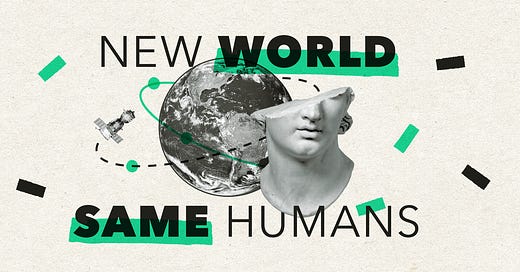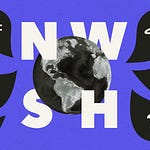Welcome to New World Same Humans, a weekly newsletter on trends, technology, and society by David Mattin.
If you’re reading this and you haven’t yet subscribed, then join 16,000+ curious souls on a mission to build a better shared future 🚀🔮
This week Facebook announced that they’ll restore news content to Australian users.
The tech giant has promised to sign payment deals with media providers; in return, the Australian government has backed down on plans to force the platform to pay every time a user links to news content.
It’s an uneasy truce in a dispute that raised deep questions about the future of the internet, and the survival of independent journalism in a connected world.
So this week, reflections on all that. All centred around three questions. What happened to the dream of the open web? How do we build a better internet? And what will it take to save the news industry?
Go ahead; hit play!
If you’d prefer to read this week’s instalment, go here for the text version of New World Same Humans #55.
Links in this week’s instalment
1. Next month it will be 31 years since Tim Berners-Lee sent a memo entitled Information Management: A Proposal to his boss at the physics research laboratory CERN.
2. Worldwide, around 90% of internet searches take place on Google properties.
3. Here in the UK, Facebook accounts for around 50% of display ad revenue.
4. A range of observers, including Berners-Lee himself, criticised the Australian legislation because it breaks a traditional principle of the open web: frictionless linking between pages.
5. Here in the UK, Facebook paid £28.5 million in corporation tax last year.
6. We’re a long way from Web3 decentralised apps, or Dapps, that replace Google, Facebook, or Uber.
7. A familiar face is working to make the new dream of a decentralised web a reality.
Get the memo
Thanks for reading this week.
I remember feeling a tectonic shift online when Web 2.0 emerged in the early 2000s. Now, I’m increasingly persuaded that we will see an even more significant change via the technologies of decentralisation. But how soon?
Of course, New World Same Humans is already built on one of the great, decentralised technologies of web 1.0: email!
This week, I’d love it if you used the power of your email network to help fuel our amazing community.
Remember, our community becomes smarter, more creative, and more useful as it becomes larger and more diverse. To help, why not take a second to forward this email to one person – a friend, relative, or colleague – who’d also enjoy it? Or share New World Same Humans across one of your social networks, and let others know why you think it’s worth their time.
Your membership of this community means a lot. I’ll be back on Wednesday with news and analysis in New Week Same Humans. Until then, be well,
David.















Share this post